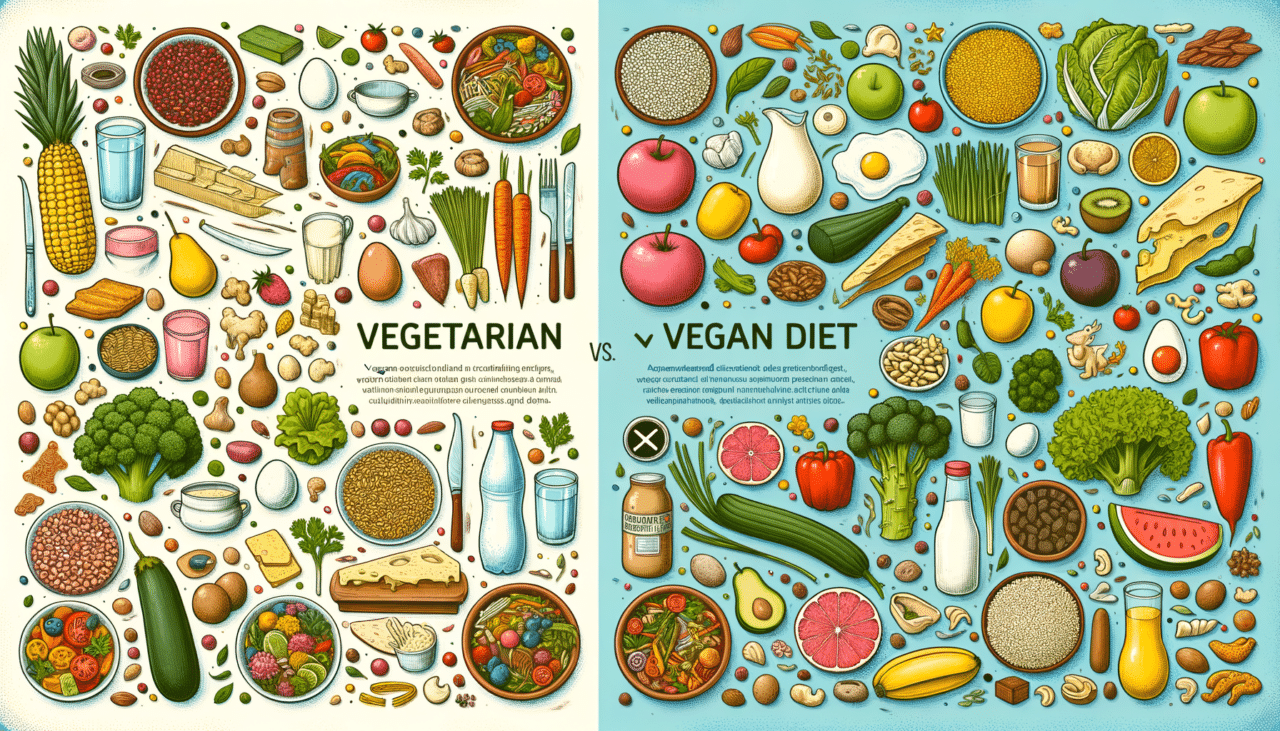In today’s health-conscious world, many individuals are turning to plant-based diets. Among the most popular choices are vegetarian and vegan diets. While they may seem similar, there are distinct differences between these two dietary lifestyles. This article aims to provide an in-depth comparison of vegetarian and vegan diets, highlighting their main characteristics, benefits, and potential challenges. We will also include a comparative table for easy reference.
Understanding the Vegetarian Diet
Characteristics of a Vegetarian Diet:
-
Definition: A vegetarian diet excludes meat, fish, and poultry but may include other animal products such as dairy and eggs.
-
Types:
- Lacto-vegetarian: Includes dairy products but excludes eggs.
- Ovo-vegetarian: Includes eggs but excludes dairy products.
- Lacto-ovo vegetarian: Includes both dairy products and eggs.
-
Pescatarian: Includes fish and seafood but excludes other meats.
-
Nutritional Focus: Emphasizes fruits, vegetables, grains, legumes, nuts, and seeds, supplemented by dairy and/or eggs depending on the type.
-
Health Benefits:
- May reduce the risk of chronic diseases like heart disease, hypertension, and type 2 diabetes.
- Supports weight management and improved digestion.
-
Rich in fiber and essential nutrients such as vitamins C and E, folic acid, and magnesium.
-
Challenges:
- Potential deficiency in vitamin B12, iron, zinc, and omega-3 fatty acids.
- Requires careful meal planning to ensure balanced nutrition.
Understanding the Vegan Diet
Characteristics of a Vegan Diet:
-
Definition: A vegan diet excludes all animal products, including meat, fish, dairy, eggs, and any other animal-derived substances.
-
Nutritional Focus: Entirely plant-based, focusing on fruits, vegetables, grains, legumes, nuts, and seeds.
-
Health Benefits:
- Linked to lower cholesterol levels and reduced risk of heart disease.
- May aid in weight loss and promote healthier blood sugar levels.
-
High in dietary fiber and rich in antioxidants.
-
Challenges:
- Higher risk of deficiencies in vitamin B12, iron, calcium, vitamin D, and omega-3 fatty acids.
- Requires supplementation and/or fortified foods to meet nutritional needs.
Comparative Table: Vegetarian Diet vs. Vegan Diet
| Feature | Vegetarian Diet | Vegan Diet |
|---|---|---|
| Animal Product Consumption | Includes dairy and/or eggs depending on the type | Excludes all animal products |
| Types | Lacto, Ovo, Lacto-Ovo, Pescatarian | No subtypes, strictly plant-based |
| Nutritional Focus | Plant-based with some animal products | Entirely plant-based |
| Health Benefits | May reduce chronic disease risk, supports digestion | Linked to lower cholesterol, weight loss |
| Potential Deficiencies | Vitamin B12, iron, zinc, omega-3 fatty acids | Vitamin B12, iron, calcium, vitamin D, omega-3 fatty acids |
| Required Supplements | Possible vitamin B12 and omega-3 | Likely vitamin B12, vitamin D, calcium, omega-3 |
| Environmental Impact | Lower than omnivorous diets | Generally lower than vegetarian diets |
Conclusion
Both vegetarian and vegan diets offer numerous health benefits and support a more sustainable lifestyle. However, they require careful planning to ensure adequate nutrition. Vegetarians may have a slightly easier time meeting nutritional needs due to the inclusion of dairy and eggs. Meanwhile, vegans often need to rely on supplements or fortified foods to prevent deficiencies. Ultimately, the choice between a vegetarian and vegan diet will depend on individual health goals, ethical beliefs, and lifestyle preferences.
For those considering a transition to a plant-based diet, it’s advisable to consult with a healthcare provider or nutritionist to create a balanced and nutritious meal plan. Whether you choose a vegetarian or vegan lifestyle, both offer a path to a healthier and more environmentally-friendly way of living.

Comments (0)
There are no comments here yet, you can be the first!